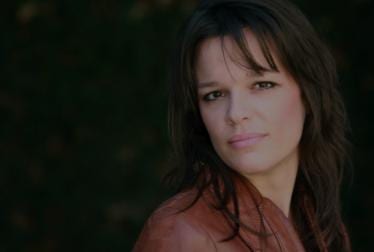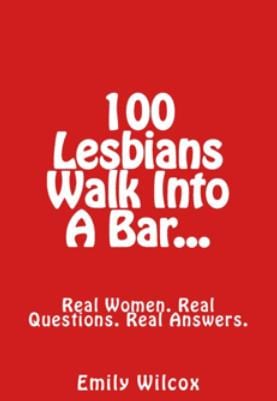So what happens when 100 lesbians walk into a bar?
Ask Emily Wilcox.
The relationship expert and advice columnist attempts to offer insight into lesbian relationships in her new self-published book.
“My advice column, ‘Ask Emily,’ inspired the idea,” Wilcox says. “I had so many questions that I decided to put them into a book that would hopefully help lesbian women out there who are stuck in a bad relationship, trying to fix a mediocre one or find lasting love.
“The old adage of supply and demand, I suppose. No topic is off limits, and I just answered what came into my email. I had very dedicated readers and had a lot of questions to choose from for the book. Women come to me because they have problems, not because their love lives are going great, so it’s a free-for-all and a cacophony of real-life issues, from sex to depression to soulmates.”
Wilcox, who identifies as bisexual, is based in Los Angeles, where she says she finds herself intrigued and fascinated by lesbian relationships and the dynamics between women.
The question-and-answer-style book is a quick read, and it’s both hilarious and sarcastic. At moments trite, 100 Lesbians Walk into a Bar is perfect for those who love to read advice columns in glossy magazines.
Stories from Wilcox’s six years as a certified life coach and advice columnist span sexuality, co-dependency, commitment-phobia, communication, self-esteem, trauma, abandonment, rape, loss and grief. Readers can find her Ask Emily published in Curve, FHM, Diva and on the She Wired website.
“Sexuality is our basic nature. It’s an intrinsic part of who we are, and it’s something we cannot change whether gay, bisexual, transgender or straight,” she says. “Within a lesbian relationship, one of the only differences is that the estrogen levels can be higher and emotions can easily run deeper. But that being said, our sexual identities do not actually play a huge role in how we behave and relate within our relationships.
“The universe has supplied all of us with the same feelings of love and the need to connect, whether that is towards women, men or otherwise. Our innate feelings are not only the same, but they are what connect us to each other and to the world.”
Wilcox plans to donate a percentage of the book’s proceeds to the Human Rights Campaign.
“The only way we can change our relationships is by first changing ourselves, and in this regard, it is a universal message. Relationships don’t have problems — people do,” she says. “We are not different internally, and we all look for that same love and acceptance. But lesbian couples have better communication skills because women are naturally better communicators. Our problem can sometimes be our need to over-communicate.”
Throughout the book, Wilcox’s message is clear: you can’t love anyone until you love yourself.
“Self-love can be attained in a few ways,” she says. “One is that we must forgive our pasts. Whether that means those who have hurt us or the choices and mistakes we have made. All of our negative beliefs and concepts about who we are come from the past, which no longer even exists but in our minds. We have to question every single negative thought and put it in its appropriate resting place.”


 Why you can trust Xtra
Why you can trust Xtra


